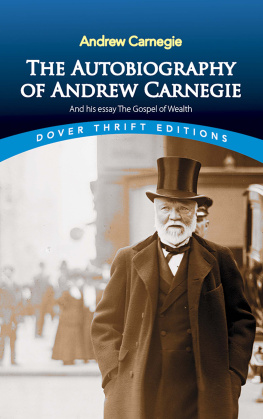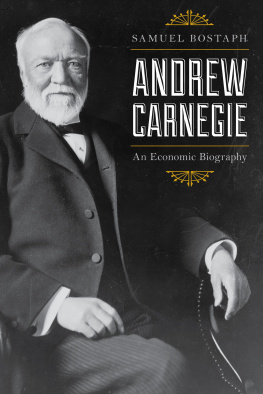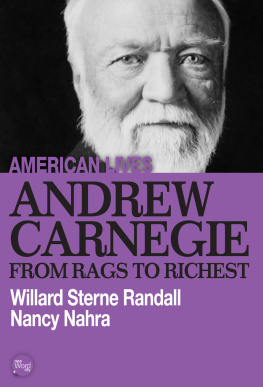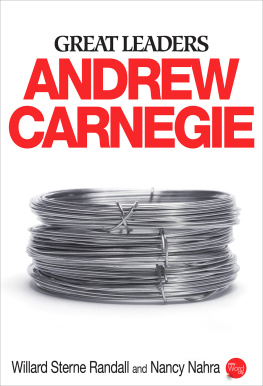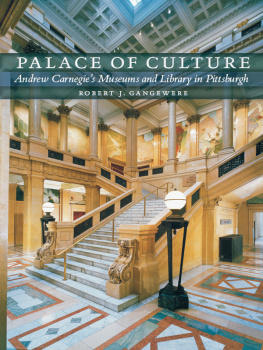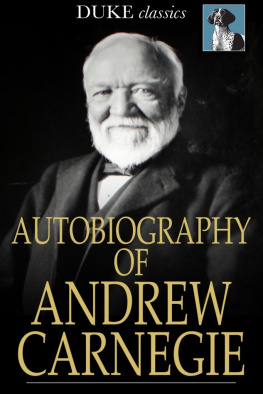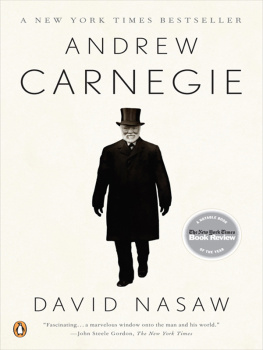Transcriber's Note:
Obvious typographical errors have been corrected. Inconsistent spelling and hyphenation in the original document have been preserved.
Page : "Aaleck not El-eck" might have a diacritical mark over the a.
Page : "I've 'earn tell" possibly should be "I've 'eard tell".
Page : The frontispiece cited was not included in this printing.
Page : "caller" possibly should be "calmer".
Page : "Frith" possibly should be "Firth".
an
American Four-in-Hand
In Britain
BY
ANDREW CARNEGIE
NEW YORK
CHARLES SCRIBNER'S SONS
1899.
Copyright, 1883, 1886, by
CHARLES SCRIBNER'S SONS.
Press of J. J. Little & Co.
Astor Place, New York
I DEDICATE THESE PAGES
TO
My Favorite Heroine ,
My Mother.
AN AMERICAN FOUR-IN-HAND
IN BRITAIN.
Long enough ago to permit us to sing, "For we are boys, merry, merry boys, Merry, merry boys together," and the world lay all before us where to choose, Dod, Vandy, Harry, and I walked through Southern England with knapsacks on our backs. What pranks we played! Those were the happy days when we heard the chimes at midnight and laughed Sir Prudence out of countenance. "Dost thou think, because thou art virtuous, there shall be no more cakes and ale?" Nay, verily, Sir Gray Beard, and ginger shall be hot i' the mouth too! Then indeed
"The sounding cataract
Haunted me like a passion; the tall rock,
The mountain, and the deep and gloomy wood,
Their colors and their forms, were then to me
An appetite; a feeling and a love
That had no need of a remoter charm,
By thought supplied, or any interest
Unborrowed from the eye."
It was during this pedestrian excursion that I announced that some day, when my "ships came home," I should drive a party of my dearest friends from Brighton to Inverness. Black's "Adventures of a Phaeton" came not long after this to prove that another Scot had divined how idyllic the journey could be made. It was something of an air-castleof a dreamthose far-off days, but see how it has come to pass!
Air-Castles.
The world, in my opinion, is all wrong on the subject of air-castles. People are forever complaining that their chteaux en Espagne are never realized. But the trouble is with themthey fail to recognize them when they come. "To-day," says Carlyle, "is a king in disguise," and most people are in possession of their air-castles, but lack the trick to see 't.
Look around you! see Vandy, for instance. When we were thus doing Merrie England on foot, he with a very modest letter of credit stowed away in a belt round his sacred personfor Vandy it was who always carried the bag (and a faithful treasurer and a careful one toogood boy, Vandy!); he was a poor student then, and you should have heard him philosophize and lord it over us two, who had been somewhat fortunate in rolling mills, and were devoted to business. "Great Csar! boys, if I ever get fifteen hundred dollars a year income!" (This was the fortune I was vaguely figured up to be worth under ordinary conditions.) "Great Csar! boys"and here the fist would come down on the hard deal table, spilling a few drops of beer"fifteen hundred dollars a year! Catch me working any more like a slave, as you and Harry do!" Well, well, Vandy's air-castle was fifteen hundred dollars a year; yet see him now when thousands roll in upon him every month. Hard at it stilland see the goddess laughing in her sleeve at the good joke on Vandy. He has his air-castle, but doesn't recognize the structure.
There is Miss Fashion. How fascinating she was when she descanted on her air-castlethen a pretty cottage with white and red roses clustering beside the door and twining over it in a true-lover's knot, symbolizing the lover's ideal of mutual help and dependencethe white upon the red. No large establishment for her, nor many servants! One horse (I admit it was always to be a big one), and an elegant little vehicle; plenty of garden and enough of pin money. On this point there was never to be the slightest doubt, so that she could really get the best magazines and one new book every monthany one she chose. A young hard-working husband, without too much income, so that she might experience the pleasure of planning to make their little go far. Behold her now! her husband a millionaire, a brown-stone front, half a dozen horses, a country place, and a box at the opera! But, bless your heart! she is as unconscious of the arrival of her castle as she is that years creep upon her apace.
The Goddess Fortune, my friends, rarely fails to give to mortals all they pray for and more; but how she must stand amazed at the blindness of her idolators, who continue to offer up their prayers at her shrine, wholly unconscious that their first requests have been granted! It takes Fortune a little time to prepare the gifts for so many supplicantsthe toys each one specially wants; and lo and behold! before they can be delivered (though she works with speed betimes) the unreasonable mortals have lost conceit of their prizes, and their coming is a mockery; they are crying for something else. If the Fates be malignant, as old religions teach, how they must enjoy the folly of man!
Imagine a good spirit taking Fortune to task for the misery and discontent of mortals, as she gazes with piteous eyes upon our disappointments, our troubles, and, saddest of all, our regrets, charging her with producing such unhappiness. "Why have you done this?" would be the inquiry. Listen to the sardonic chuckle of the Fate: "Hush! I've only given them what they asked (chucklechucklechuckle)! Not my fault! See that unhappy wretch, sleeplessly and feverishly tossing on his pillow, and in his waking hours absorbing all his lofty faculties in gambling at the Stock Exchangewife, children, home, music, art, culture, all forgotten. He was once a bright, promising, ingenuous youth. He was born among trees and green fields, spent the morn of life in the country, sensitive and responsive to all nature's whisperings; lay in cool, leafy shades, wandered in forest glades, and paddled in the 'complaining brooks which make the meadow green.' Nay, not many years ago he returned at intervals to these scenes, and found their charm had still power over himfelt the truth of the poet's words, that



